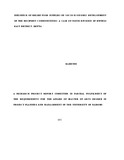| dc.contributor.author | Kyavoa, Charles K | |
| dc.date.accessioned | 2012-11-28T12:25:03Z | |
| dc.date.available | 2012-11-28T12:25:03Z | |
| dc.date.issued | 2012 | |
| dc.identifier.uri | http://erepository.uonbi.ac.ke:8080/xmlui/handle/123456789/6563 | |
| dc.description.abstract | The purpose of this study was to investigate the effects of relief food dependency on the socio-economic development of the local communities in Nguni division Mwingi East District in Eastern Province. The study focused on identifying the main factors contributing to relief food supplies dependency among the local communities and the socio-economic effects of relief food dependency on the local communities and to understand which alternative economic activities they practiced.
The sample size consisted of aid agencies representatives, district officer, chiefs and household heads. The respondents were sampled from Nguni division. Simple random sampling methods were applied to pick the required sample size for the study. Data was collected by use of two instrUments. These included interview schedules for relief aid agencies and district officer and questionnaires for chiefs and local house hold heads. Data collected was analyzed by use of
descriptive, inferential statistics with the help of Statistical package for Social Sciences (SPSS). The study revealed that there was a gender imbalance in the leadership roles since majority of chiefs and household heads were male. Drought and political instability contributed greatly in relief food supplies dependency.
This call for research to pinpoint what the stakeholders can do to enhance self reliance and self dependency. Since Subsistence farming is the most preferred alternative economic activity practiced by the local community more efforts should be addressed into improving fanners to adopt modem methods of fanning. The researcher further recommends that the govenunent should put in place measures to curb lowering of grain prices due to increased amounts of relief food since relief food is sold at lower prices by recipients hence lowering the demand for fanners' grains due to increased supply. | en_US |
| dc.language.iso | en_US | en_US |
| dc.publisher | University of Nairobi, Kenya | en_US |
| dc.title | Influence of relief food supplies on socio economic development of the recipient communities: a case of Nguni division of Mwingi East district, Kenya | en_US |
| dc.title.alternative | Thesis (MA) | en_US |
| dc.type | Thesis | en_US |

